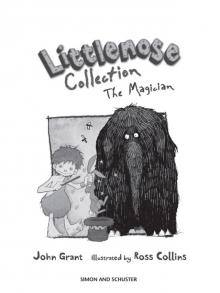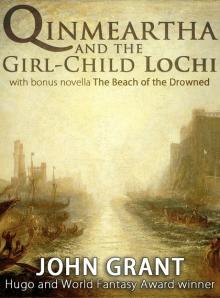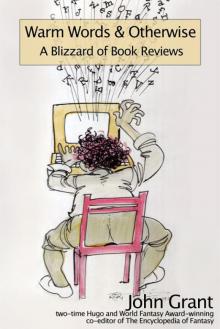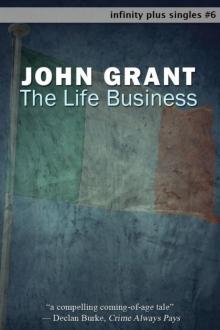- Home
- John Grant
Warm Words & Otherwise: A Blizzard of Book Reviews
Warm Words & Otherwise: A Blizzard of Book Reviews Read online
Table of Contents
Introduction
The Touch
A Step Beyond
Hopscotch
The Verificationist
It's Been a Good Life
The Lost
Atom
Black Projects, White Knights
Coldheart Canyon
The Fifth Victim
A Matter of Profit
Thief of Souls
Lazy Bones
Sarah's Landing 1
Pretty Dead
From the Dust Returned
Let's All Kill Constance
Boost
Expatria
Keepers of the Peace
Collecting Candace
The Curse of Chalion
Saturday Morning Fever
Voice of the Violin
The Wooden Sea
Nemesis
Tempter
Into the Web
Peril
Fault Lines
The Feminists
Kunma
Terror Tales of the City: Prince of the Perverse
Fountain Society
Prey
Nalda Said
The Compleat Enchanter: Fantasy Masterworks 10
Singularity
The Mind Box
The Dead Wives Society
Regina's Song
The Shroud of the Thwacker
Children of the Star
Enchantress from the Stars
Time Traveling with Science and the Saints
Artifacts
Fever 42
Through the Wormhole
Pigtopia
Galactic Rapture
The Portrait of Mrs. Charbuque
Daughters of a Coral Dawn
Reunion
Last Harbor
Fitcher's Brides
Alone
The Killing Hour
The Survivors' Club
Science Good, Bad and Bogus
Death in Dublin
Vaporetto 13
Motion to Kill
The Tarzan Chronicles
The Anniversary
Lost Stories: 21 Long-Lost Stories from the Bestselling Creator of Sam Spade, The Maltese Falcon, and The Thin Man
A Caress of Twilight
A Time Gone By
Empty Cities of the Full Moon
A Season for the Dead
Lucifer's Shadow
Supping with Panthers
Sense of Evil
The Program
Timeshift
The Murder Room
Deadly Visions
Speak Now
Dark Terrors 4
The Tooth Fairy
The Anatomy Lesson
Edward Maret
Surgical Risk
Right to Life: A Novella and Two Stories
Bag of Bones
The Knotted Cord
The Moth Diaries
The Buzzing
From the Corner of His Eye
Fury
Impact Parameter, and Other Quantum Realities
Dead Man Riding: A Nell Bray Mystery
i-o
Fantastic Tales
Silence and Shadows
Fat Ollie's Book
Rules of the Hunt
Deepsix
Guilty Until Proven Guilty
Northern Gothic
Windhaven
Come Fygures, Come Shadowes
Noir: Three Novels of Suspense
Picoverse
Bronwyn Book One: Palaces & Prisons
Remnant Population
The Speed of Dark
The Dreamthief's Daughter
Shockingly Close to the Truth: Confessions of a Grave-Robbing Ufologist
Suicide Casanova
The Integral Trees
Flying Cups & Saucers: Gender Explorations in Science Fiction & Fantasy
Phoenix Fire
The Burden of Indigo
Decadence
Thief of Time
Song of the Bones
The Extremes
The Prestige
Dirty Boots
Resurrection Men
Hell on Earth
Operation Hollywood: How the Pentagon Shapes and Censors the Movies
Scorched Earth
Any Time At All
Salt
The Years of Rice and Salt
The First Cut
The Vampire's Violin
Home Front
Next of Kin
Ship of Fools
Drive
Quietus
Louisiana Breakdown
The Grail Conspiracy
The Longest Way Home
Way Station
Worlds Enough & Time: Five Tales of Speculative Fiction
Cavalcade
What Rough Beast
Heart of Ice, Blood of Fire
Has Science Found God?
Return to Isis
The Legend of Rah and the Muggles
Blade of Tyshalle
Selected Stories
The Companions
Singer from the Sea
Terror Firma
Games Dead People Play, and Other Stories
The Book of Revelation
The Assassins of Tamurin
Big Planet
Bloodlines
Golem
The Reunion
Journeys into Limbo
The Psychotronic Video Guide
The Mechanics of Wonder: The Creation of the Idea of Science Fiction
God Save the Mark
Love Spell
The Rift
Passage
The Haunted Air: A Repairman Jack Novel
Hosts: A Repairman Jack Novel
The World and Other Places
Going, Going, Gone
The Otherhood
Magic Time
TWO GROUP REVIEWSCruci-Fiction
Across the Sea of Genre
Warm Words & Otherwise
A Blizzard of Book Reviews
John Grant
Cover art by Ron Tiner
Warm Words & Otherwise: A Blizzard of Book Reviews
A bumper collection – over 150,000 words! – of book reviews, many of full essay length, by the two-time Hugo winning and World Fantasy Award-winning co-editor of The Encyclopedia of Fantasyand author, among much fiction, of such recent nonfiction works as Corrupted Science and Denying Science.
Scholarly, iconoclastic, witty, passionate, opinionated, hilarious, scathing and downright irritating by turn, these critical pieces are sure to appeal to anyone who loves fantasy, science fiction, mystery fiction, crime fiction and many points in between ... and who also enjoys a rousing argument.
Published by infinity plus at Smashwords
www.infinityplus.co.uk/books
Follow @ipebooks on Twitter
© John Grant 2011
Cover © Ron Tiner
ISBN: 9781465982278
This ebook is licensed for your personal enjoyment only. This ebook may not be re-sold or given away to other people. If you would like to share this book with another person, please purchase an additional copy for each recipient. If you’re reading this book and did not purchase it, or it was not purchased for your use only, then please return to Smashwords.com and purchase your own copy. Thank you for respecting the hard work of this author.
No portion of this book may be reproduced by any means, mechanical, electronic, or otherwise, without first obtaining the permission of the copyright holder.
The moral right of John Grant to be identified as the author of this work has been asserted b
y him in accordance with the Copyright, Designs and Patents Act of 1988.
Electronic Version by Baen Books
Introduction
Why would anyone want to read a collection of book reviews?
It's a very good question, and one to which I'm not certain I have any coherent answer. The fact of the matter, though, is that book reviews have a power to fascinate us. Some friends in London have a bathroom shelved with old copies of Foundation and other literary magazines, and I'm far from the only guest of theirs to find myself spending far longer closeted than I'd originally intended. And one of the great joys of browsing through old magazines like the Edinburgh Review is discovering reviews of books you never knew existed by authors who've often been long ignored.
All right, then: an ancillary question. Why would anyone want to read a collection of my book reviews?
Let me get back to you on this.
~
The vast majority of the reviews in this book were produced in the early and middle years of the 21st century's first decade for two online venues, the website infinity plus, edited by Keith Brooke, and the genre-fiction webzine Crescent Blues, edited by Jean Marie Ward. Reviews for the former could be of any length I chose, and so some of the ones you'll find here are fairly long – up to several thousand words. Reviews for Crescent Blues, by contrast, were limited to 500 words (although I did, as you'll see, occasionally succeed in persuading Jean Marie to relax the rules a little). In the case of some of the other reviews here the wordcounts imposed by editors were even tighter and the dicta even stricter.
I discovered there were different skill sets (to use that ghastly but useful modern term) involved in writing essay-style reviews than in producing the shorter style; in the former I could bring in lots more information from outwith the scope of the book under consideration, and also I could opt far more for analysis and, to back up my contentions, citations of specific pieces of text or summaries of various plot points. Yet I soon found, too, that I could, as it were, sneak bits of analysis into the shorter-style reviews as well. My technique became to write the Crescent Blues (and similarly constrained) reviews to a length somewhat greater than would ever see print, then cut the text down savagely. Of course, I now wish I'd kept my original drafts ...
A few other magazines are represented here by a small number of reviews, sometimes just one: SFX, Foundation, Extrapolation and most especially the horror magazine Samhain, edited by John Gullidge. There are also a handful of reviews where, embarrassingly, I can no longer remember who they were written for. Google helped me in a couple of instances, but not for that final hard core. I can only assume they appeared in print magazines, and that my file copies of the relevant issues have long vanished into the quicksand of time. One culprit in this latter context may be my tumultuous move from one continent to another in 1999, during which a lot of stuff was discarded.
In pulling together this collection I obviously did a fair amount of basic copyediting and proofreading. (I was chagrined to find how many typos and general screw-ups there were in what I'd assumed to be pristine text! My apologies to all my original editors for the work I made for them.) I've excised some of my more irritating outbursts of adolescent snottiness and – although you may find this hard to believe as you read – plenty of incidences of ghastly, self-important pomposity. I've tidied up various instances of repetitive ideas and phraseology; for example, when reviews appeared separately it didn't much matter if I quite often said a book was "well worth your while", but when reading the text all together I found the repeated phrase rebarbative. I've added a few footnotes, clearly labelled, where it has seemed to me that an extra comment from the perspective of 2011 is called for. And I've on occasion found myself trying my damnedest to remember the first thing about books that in my reviews I described as "unforgettable".
Most of the books discussed are fiction, split about half and half (although I haven't counted) between fantasy/science fiction and mystery/crime. There are also a few nonfiction books represented here, many of them from the publisher Prometheus. At the moment I'm going through the copyeditor's corrections for my own first book for Prometheus, Denying Science. It's a small world, or something. What worries me is that I see I've quite often been a bit scathing about the standards of proofreading and so forth in the Prometheus books I've reviewed. Fingers crossed none of their staffers ever ventures here ...
During the surprisingly long editorial process involved in preparing this text it was borne in on me more and more what a huge debt of gratitude I owe to the authors of all the books reviewed here, even the ones where my comments have been less than complimentary. Writing about those books has shaped the person I am today, and the way that I look at the world.
—John Grant, Hewitt, June 20 2011
The Touch
created by Steven-Elliot Altman, edited by Patrick Merla
ibooks, 347 pages, paperback, 2000
A Write Aid project to benefit the charities HEAL and F.A.C.T.
Imagine the problem facing the potential reviewer of a charity anthology – the authors have contributed for free, and so it must have been especially difficult for the editor to turn any offering down. Of course, one wants the venture to succeed: the charity, and the people dependent upon it, need as much support as they can get. At the same time, the reader – the person who may go out and spend $14.00 on the book – must not be misled as to its quality. The dilemma can best be expressed in the following terms: "What the hell do I do if the book's no good?"
Luckily, this is not a worry that affects The Touch. Of the 23 stories here, only two are weak (and those by two of the most famous authors to contribute); perhaps two more are so-so, but all the rest vary between good and excellent, with the average probably being somewhere around the "extremely good" mark and one story in particular being a gem.
So, the mechanics:
This is a theme anthology, the theme being that, sometime in the near future or even the near past, a new epidemic has inflicted humanity. The form this epidemic takes is that those infected by the disease, should they touch a non-infected human being, will deprive that human of one or more senses. In most of these stories the sense concerned is a fairly obvious one: sight, hearing, sexual desire, speech. In some it is more subtle than that. A few of the most effective stories concern such subtleties: in one the sense involved is the ability to order one's experiences, in another it is the ability to hear music in one's head, and in a third it is the ability to recognize faces. At the same time there are a couple of exceptional stories that use the more obvious senses as their underpinnings. What all of these outstanding tales share is a focus on the human aspects of either (a) being deprived of a sense or (b) being one of the witting or unwitting infecters, a "Depriver".
The arrangement of the stories accords approximately to a chronology of the spread of the Depriver disease, with the earliest stories happening a little before 2001 and the later ones being set well into the future. The stories do not actually pull together to form a coherent pseudo-history, but this does not matter. What is important is that the idea itself has sparked off such a plethora of good stories. A measure of the general quality is that, after reading a bunch of these stories, you have to remind yourself to remember that touching another human being in real life is actually (probably) safe enough.
What, then, are the best stories of a very good bunch?
Karl Schroeder's "After the War", set in the former Yugoslavia during the civil war there that the West largely just watched, is a study of victims, both those who have suffered directly from the massacres and those who have been sufficiently brutalized by the political and racist climate to perpetrate those massacres. It is a moving tale, reminding us that we condemn others at our own peril.
In a way Harry Turtledove's "The Lieutenant" does the same, although here the viewpoint is different. Whereas Schroeder's story looks from the inside at the very human tendency to condemn – seeing it as rooted in the predilection to
victimize – Turtledove's story regards these twin motivations from the outside, seeing both as based in self-interest. "The Lieutenant" loses power as a result, but is nevertheless a fine tale; in other company it might be outstanding.
Diane Dekelb-Rittenhouse's "Gifted" truly is outstanding. It centres on a precociously young musician who falls for an older (not much) patroness of the arts who is a Depriver. The touch of her hands is enough to induce deafness in others. The musician himself has already been deprived of his talent in a more mundane fashion: a child prodigy not just as a player but as a composer, he has been robbed of his ability to compose through the insensitivity of his overweening father, who through relentlessly pressing him to attain ever more has succeeded in making him attain less. The result of all this is a superbly human story which will bring close to tears anyone who loves music.
Bob Mahnken's "Shared Losses" is another fine story. Its focus is bigotry, personified by the elderly narrator, who, although female, exemplifies the male backwoods American (alas, still extant) whose solution to anything untoward is to shoot it. The story harks back to an earlier era of sf – it could well have been written by Clifford Simak had Simak's times been a bit more liberated – but loses nothing thereby. What Mahnken impressively succeeds in doing, even as one weeps for the victims of the bigotry, is make one sympathetic towards the bigot herself; no mean feat. And yet, of course, until bigotry is understood it will never disappear – a point that is perhaps one of the main subtexts of this book.
Then there's Sean Stewart's "Don't Touch Me". Like Mahnken's, this tale eschews any consideration of the more obscure senses the Deprivers might inadvertently steal; here the focus is on love stolen by the conditions the disease imposes. Several of the stories in this anthology concern the insuperable obstacle that the inability to touch places upon the course of love (generally on the obstacle it presents to sex), but this one triumphs through its attention to character: its narrator is a recently dumped adolescent male; the object of his rebound attraction is a girl who would be fascinating at any other time but is doubly so right now. The integrity of the telling makes this another powerful tale.
But the gem of the entire anthology is Dean Whitlock's ambitious and unbelievably well achieved "Waiting for the Girl from California". This is a story so good, and so beautifully written, that it sings from the pages. It is so poignant in both its concept and its telling that it makes one ache ... and if I told you a single thing more about it I'd spoil it for you. If this tale goes unrecognized by some award or another then the whole awards system must come under scrutiny. If you bother to read not one other story in the anthology, your fourteen bucks will have been well spent. This is what fiction – and most especially speculative fiction – is all about. It is a long time since this reviewer has been so affected by a story, all the more remarkable since this one is a mere sixteen pages long.

 Littlenose Collection The Magician
Littlenose Collection The Magician Qinmeartha and the Girl-Child LoChi
Qinmeartha and the Girl-Child LoChi Take No Prisoners
Take No Prisoners Warm Words & Otherwise: A Blizzard of Book Reviews
Warm Words & Otherwise: A Blizzard of Book Reviews Strider's Galaxy
Strider's Galaxy The Life Business
The Life Business